- AI
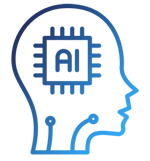
Artificial Intelligence

Smart Products & Services
We follow Smart Products & Services

Intelligent Business Functions & Processes
We follow Intelligent Business Functions & Processes

Robotic Process Automation
We follow Robotic Process Automation

Personalized
healthcareWe follow Personalized healthcare

Identifying at-risk patients
We follow Identifying at-risk patients

Optimized routing and scheduling
We follow Optimized routing and scheduling
- ML
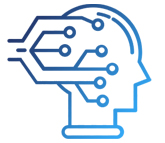
Machine Learning

Predictive
AnalyticsWe follow Predictive Analytics

Service Personalization
We follow Service Personalization

NLP
We follow NLP (Natural Language Processing)

Stock Market Forecasting
We follow Stock Market Forecasting

Fraud Prevention
We follow Fraud Prevention

Recommender engines
We follow Recommender engines
- blockchain
- IOT
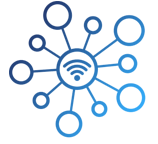
Internet of Things
- AR
- Business Solutions
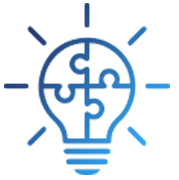
Business Solution

Business Performance Management
We follow Business Performance Management

Decision Making & Big Data Analytics
We follow Decision Making & Big Data Analytics

Enterprise Data Management
We follow Enterprise Data Management
- Apps
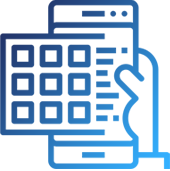
Apps

Native Apps
We follow Native Apps

Cross Platform Apps
We follow Cross Platform Apps

Web Apps
We follow Web Apps

Hybrid Apps
We follow Hybrid Apps

Cloud Native Apps
We follow Cloud Native Apps
- Lab

Healthcare Apps Types, Current Trends and Revenue Models
Healthcare apps are a true blessing in our modern world, thanks to advancements in technology. These mobile apps have the incredible ability to monitor, detect, and even treat various illnesses, making them indispensable tools for improving human lives.
These healthcare apps are not limited to just managing chronic diseases; they go above and beyond by providing valuable information and statistics about various medical conditions. Here comes the healthcare app development company in the UK.
According to Mobius MD’s reports, the healthcare app market surpassed a staggering $47.7 billion in value in 2021. Statista predicts that this industry will skyrocket to an astonishing $189 billion by 2026.
Moreover, over 87 million people in the United States alone are now regularly using healthcare apps, demonstrating the surging interest in this technology.
This remarkable growth can be attributed to several factors, including the global impact of COVID-19, the ease of access to healthcare resources through these apps, and their ability to provide swift and informative reports. These apps are indeed a lifeline for individuals dealing with illness, allowing them to lead everyday lives while being closely monitored.
Types Of Healthcare Apps
Healthcare apps have become the top choice for people worldwide. In 2021, the Apple Store boasted a whopping 51,370 healthcare apps. So, when thinking about creating your own healthcare or fitness app, it’s crucial to grasp the different categories that help distinguish these apps. There are five distinct types of healthcare apps to consider.
Apps For Urgent Care
Apps designed for urgent care are a real lifesaver during emergencies. These apps play a crucial role in helping patients locate nearby urgent care facilities. They provide information about costs, travel time, waiting times, and even directions to these facilities.
Key features you can expect from an urgent care app include:
- Expected Cost Calculator: Helps users estimate the expenses they might incur.
- GPS Functionality: Detects the nearest emergency rooms based on the user’s location.
- Contact Information: Provides users with essential contact details for emergency rooms.
An excellent example of an urgent care app is “Walk-In Urgent Care.” This app stands out for its ability to assist with various medical issues such as allergies, colds, coughs, UTIs, and more.
Key features of the “Walk-In Urgent Care” app include:
- Family Member Option: Allows users to add their family members’ details conveniently.
- Location Services: Provides the location of nearby urgent care units for quick access.
- Call-In Services: Offers the convenience of making appointments through the app.
Urgent care apps like “Walk-In Urgent Care” are invaluable tools for quick and efficient healthcare access, particularly during critical situations.
-
Healthy Lifestyle Upkeep Apps

Apps that focus on helping individuals maintain a healthy lifestyle are a valuable resource. These apps serve to educate users, remind them about regular checkups, and offer guidance on activities that promote a healthy life. They encompass a wide range of functions, including exercise guidance, fitness tracking, dietary advice, and even apps tailored for pregnancy.
Key features commonly found in apps designed for maintaining a healthy lifestyle include:
- Personalised Exercise Recommendations: These apps utilise height and weight data to suggest suitable exercise routines.
- Push Notifications: They send timely reminders to encourage users to follow their health regimens.
- Dietary Guidance: Many apps provide dietary recommendations to support a balanced diet.
- Regular Checkup Reminders: Users receive reminders for critical medical checkups and appointments.
A prime example of a healthy lifestyle app is “Telehealth by HealthTap,” available in nearly 175 countries. This app, founded by Sean K Mehra in 2010, offers various beneficial features.
Key features of the “Telehealth by HealthTap” app include:
- Direct Doctor Chat: Users can chat directly with healthcare professionals.
- 24/7 Availability: The app ensures round-the-clock access to medical services.
- Multiple Consultation Modes: Users can consult via video, audio, or text with the available doctors.
- Doctor Catalog: The app maintains a comprehensive list of healthcare providers for users.
- Subscription Plans: “Telehealth by HealthTap” offers convenient monthly or annual subscription plans to cater to diverse user needs.
Apps like “Telehealth by HealthTap” are crucial in promoting and sustaining a healthy lifestyle by providing easy access to medical advice and resources.
-
General Hospital Apps

General hospital apps are valuable tools for hospitals to showcase their services and treatments. These apps provide essential information about the hospital, including details about the medical staff, available treatments, and the current wait times at the urgent care unit.
Key features commonly found in general hospital apps include:
- Promotional Tool: These apps serve as a promotional platform for hospitals, allowing them to highlight their capabilities.
- Doctor Directory: Users can access a list of doctors affiliated with the hospital.
- Service Listings: Information about the range of medical services provided by the hospital is readily available.
- Urgent Care Wait Times: Users can check the waiting times at the urgent care unit, helping them plan their visit.
An exemplary instance of a general hospital app is the Mayo Clinic app, associated with one of the largest and top-ranked hospitals in the United States. Mayo Clinic is a healthcare leader, treating around 1.3 million patients annually.
Key features of the Mayo Clinic app include:
- Appointment Booking: Users can easily schedule appointments through the app for added convenience.
- Express Care: The app offers a unique feature where patients can receive a virtual checkup within an hour.
- Lab Report Access: The app lets Patients access their lab reports directly.
- Health and Lifestyle Tips: The app provides valuable insights into fitness, healthy diets, and lifestyle choices.
- User Engagement: In May 2022, the Mayo Clinic app was downloaded by 20,000 users, showcasing its popularity and user engagement.
In essence, general hospital apps like the Mayo Clinic app are vital in connecting patients with healthcare services while providing valuable information about the hospital’s offerings.
-
Diagnosis Assistant Apps
Diagnosis assistant apps are valuable, granting patients access to their crucial lab test reports, including X-rays, sample tests, and electronic charts. These apps not only provide seamless access to reports but also offer the convenience of scheduling test appointments.
Key features commonly found in diagnosis assistant apps encompass:
- Secure Report Access: Ensures that patients can easily and securely access their lab reports.
- Contact Option: Provides a means for patients to communicate securely with healthcare providers.
- Patient History: Stores a comprehensive record of a patient’s medical history.
- Lab Test Costs: Offers transparency by listing the costs associated with lab tests.
An exemplary example of a diagnosis assistant app is “Kareo.” This app excels in digitally storing patients’ lab reports and offers additional beneficial features, including note-taking capabilities for physicians.
Key features of the “Kareo” app include:
- Appointment Booking: Users can conveniently schedule appointments for tests through the app.
- Patient Record Keeping: The app maintains a detailed record of each patient’s medical history.
- Secure Communication: Provides a secure platform for patients to communicate with healthcare professionals.
- Billing Information: Keeps a record of lab test expenses for reference.
It’s worth noting that “Kareo” achieved a remarkable revenue of $25.7 million in 2021, underlining its significance and popularity in the healthcare app landscape. In summary, diagnosis assistant apps like “Kareo” offer essential tools for patients and healthcare providers, simplifying accessing and managing critical medical information.
-
Medication Tracking Apps
Medication tracking apps are invaluable tools for patients to maintain their medication routines. These apps diligently monitor dose schedules, meal timings, and intervals between doses and provide timely medication reminders, ensuring patients stay on track with their treatments.
Key features commonly found in medication monitoring apps include:
- Blood Pressure Monitoring: Some apps offer the added benefit of checking and tracking blood pressure levels.
- Integration with Gadgets: They can seamlessly connect with other devices or gadgets to enhance functionality.
- Push Notifications and Alarms: These apps use notifications and alarms to remind users about their medication doses.
- User-Friendly Interface: They typically have an intuitive and easy-to-navigate interface.
An exemplary example of a medication monitoring app is “CareZone,” renowned for its effectiveness in helping users manage their medicines. This app was founded by Jonathan Schwartz in 2012 and underwent a significant update in early 2022, becoming part of the Walmart Wellness App.
Key features of the “CareZone” app include:
- Comprehensive Medication Records: Users can maintain detailed records, including prescriber information, dosages, and medication names.
- Blood Pressure Tracking: The app offers a built-in feature to monitor blood pressure levels.
- Medication Reminders: Users benefit from push notifications that serve as helpful reminders.
Medication tracking apps like “CareZone” ensure patients adhere to their medication regimens accurately. These apps simplify the prescription management process and contribute to better health outcomes.
Are you ready to transform healthcare with a cutting-edge app? Partner with our expert healthcare app development company in the UK. Let’s innovate together for a healthier future!
As a leading mobile app development agency in Britain, we have all the expertise required for an excellent healthcare app, like healthcare standards and medical domain knowledge. Call us anytime.
Healthcare App Industry – Current Trends
The healthcare app industry is currently witnessing several key trends:
- Patient-Generated Health Data: A prominent trend involves patients inputting critical data, such as medical history, symptoms, lab reports, and lifestyle habits. This user-generated data is at the forefront of app development.
- Data Security: In 2022, digital security is paramount across all sectors. Since patients provide sensitive and personal information, safeguarding this data is paramount.
- Location Services: Integrating GPS services allows healthcare apps to offer users convenient access to nearby hospitals, pharmacies, and laboratories. It also facilitates swift ambulance dispatch by pinpointing the patient’s location.
- Enhanced Communication: Effective communication channels between patients and healthcare providers are essential features of modern apps. These channels, whether through chatbots, phone calls, or video calls, facilitate appointment booking, consultations, and gathering valuable user feedback.
- Artificial Intelligence (AI): AI is now a fundamental component of app functionality. It allows apps to tailor their services to individual patient needs, enhancing overall user experience and efficiency.
- Integration with Wearables: The growing popularity of smart wearables has influenced healthcare app development. Apps can now seamlessly connect with these devices to provide services like monitoring blood pressure, oxygen levels, and more.
Healthcare Apps Revenue Models
Healthcare apps employ various revenue models to sustain their services:
- Freemium and Premium Model: A common approach in 2022, where healthcare apps offer a basic set of features for free (freemium) while unlocking advanced features in a premium paid version.
- Unique Content: Healthcare apps can provide expert health content, including seminar videos and guides, for a fee, enhancing their revenue streams.
- Registration and Subscription Charges: These apps, acting as platforms connecting patients and doctors, can charge users for registration or subscriptions, granting access to checkups, tests, and other services.
- Advertisements: While limited to healthcare apps, advertising opportunities exist. By collaborating with local medical equipment vendors and pharmacies, these apps can incorporate relevant ads within their functions.
- Selling: Besides medical services, healthcare apps can sell medical equipment and medicines, offering users a comprehensive service experience and generating extra revenue.
- Promotions: Offering discounts, free sessions with experts, and other incentives is an effective way for healthcare apps to engage and retain customers.
- Games: Healthcare apps can integrate educational games, such as quizzes on healthy habits, disease symptoms, and emergency procedures, to promote healthy lifestyles and boost user engagement.
Conclusion
Healthcare apps cater to universal human needs, making them an excellent avenue for a broad consumer base and profitability. These apps fall into five distinct categories, each fulfilling specific roles, and their interconnected nature enhances revenue potential.
By incorporating the latest trends, healthcare apps have the potential to address patient challenges and also generate significant revenue. E-Marketer reports that over 350,000 healthcare apps are available online, underscoring the industry’s promising future.
However, success hinges on identifying a unique selling proposition (USP) and delivering a high-quality healthcare app. Your healthcare app’s excellence and distinctiveness will determine its success.
Consider collaborating with a reputable healthcare app development company in the UK for a healthcare app.
Moreover, our expertise lies in developing custom software, like gaming, CRM, healthcare, and financial and web development software.
Our custom software development company called Sky Potential UK is the best option if you need to develop custom software.



















































Leave a Reply